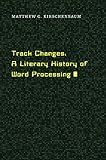Track changes : a literary history of word processing / Matthew G. Kirschenbaum.
Material type: TextPublication details: Cambridge, Massachusetts : The Belknap Press of Harvard University Press, (c)2016.Description: 1 online resourceContent type:
TextPublication details: Cambridge, Massachusetts : The Belknap Press of Harvard University Press, (c)2016.Description: 1 online resourceContent type: - text
- computer
- online resource
- 9780674969469
- Z52 .T733 2016
- COPYRIGHT NOT covered - Click this link to request copyright permission: https://lib.ciu.edu/copyright-request-form
| Item type | Current library | Collection | Call number | URL | Status | Date due | Barcode | |
|---|---|---|---|---|---|---|---|---|
 Online Book (LOGIN USING YOUR MY CIU LOGIN AND PASSWORD)
Online Book (LOGIN USING YOUR MY CIU LOGIN AND PASSWORD)
|
G. Allen Fleece Library ONLINE | Non-fiction | Z52.4 (Browse shelf(Opens below)) | Link to resource | Available | ocn947118843 |
Includes bibliographies and index.
"The story of writing in the digital age is every bit as messy as the ink-stained rags that littered the floor of Gutenberg's print shop or the hot molten lead of the linotype machine. During the period of the pivotal growth and widespread adoption of word processing as a writing technology, some authors embraced it as a marvel while others decried it as the death of literature. The product of years of archival research and numerous interviews conducted by the author, Track Changes is the first literary history of word processing. Matthew Kirschenbaum examines how the interests and ideals of creative authorship came to coexist with the computer revolution. Who were the first adopters? What kind of anxieties did they share? Was word processing perceived as just a better typewriter or something more? How did it change our understanding of writing? Track Changes balances the stories of individual writers with a consideration of how the seemingly ineffable act of writing is always grounded in particular instruments and media, from quills to keyboards. Along the way, we discover the candidates for the first novel written on a word processor, explore the surprisingly varied reasons why writers of both popular and serious literature adopted the technology, trace the spread of new metaphors and ideas from word processing in fiction and poetry, and consider the fate of literary scholarship and memory in an era when the final remnants of authorship may consist of folders on a hard drive or documents in the cloud."--Provided by publisher.
It is known -- Word processing as a literary subject -- Perfect -- Around 1981 -- North of Boston -- Signposts -- Typing on glass -- Unseen hands -- Think tape -- Reveal codes -- What remains -- After word processing.
COPYRIGHT NOT covered - Click this link to request copyright permission:
There are no comments on this title.
